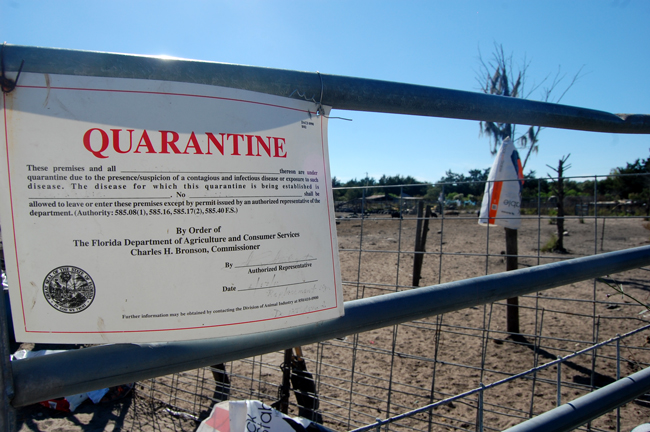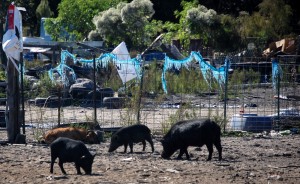
It may be the end for Lory Yazurlo’s Pig Tales Sanctuary, the troubled refuge for unwanted pot-belly and other pigs Yazurlo started in 1995 on a 20-acre property in rural Bunnell that has since turned into an ill-kept sprawl of diseased swine and refuse indistinguishable from a dumping ground (but what do you expect from a pig farm?). County, state and federal authorities since 2003 have worked with Yazurlo and shown great indulgence toward what is, at heart, a humane intention. Yazurlo’s own condition—she is a quadriplegic, the result of a wreck when she drove a truck for CSX Corp. in Washington—has added to authorities’ patience.
Click On:
- The Sentencing Order
- Craig Coffey’s Letter to the State Attorney and the USDA’s Report
- Lory Yazurlo’s Pig Tales Website
That patience ran out on Tuesday, with the closing of the latest of several windows of opportunity for Yazurlo to address innumerable issues of safety, sanitation and record-keeping at the sanctuary. County Court Judge Sharon Atack signed a sentencing order forfeiting Yazurlo’s ownership of the pigs. The order prohibiting Yazurlo “from having custody, supervision, possession, or responsibility for the care of the pigs currently on the property.” The order also authorized Flagler County “to take immediate custody of quarantined swine” and assume responsibility for the care of the animals with state and federal authorities.

Wednesday afternoon, three SUVs were parked outside the sanctuary—two of them belonging to United States Department of Agriculture officials, and one belonging to Larry Payne of the Office of Agricultural Law Enforcement. Payne was there to guard against pigs leaving the sanctuary in any way. Two USDA officials were there to assist the local humane society in feeding the animals, which they had that morning. The officials were not busy: they sat under a tree with George Pavone, Yazurlo’s companion and helper, or read in their car, with the air conditioner running. At one point Pavone asked Payne if he could borrow his gun to shoot a pig who was ailing. Payne deflected the question.
Yazurlo herself was not at the farm this afternoon. She was at the public defender’s office for part of the day, where she was given the order and was told that her options were limited to an appeal that may not yield much, and was going to a feed store later that afternoon, though it’s unclear why: she may not feed the animals herself. There are close to 400 pigs on the property. The pigs’ numbers peaked at 800 a few years ago. Speaking through a friend while she was at the public defender’s office, Yazurlo said the county was claiming she’s not taking care of the pigs “because they’re skinny and old, but that’s what happens when we’re old.”
In an interview late Wednesday evening, Yazurlo said she had no doubts that authorities’ “ultimate plan is to put them down.” She said the Flagler County Humane Society took care of the pigs two years ago but had to stop because it ran out of money: it costs Yazurlo $120 a day to feed the herd. “They couldn’t keep feeding them then. They’re not going to be able to feed them this time,” certainly not for a year, the length of the court order’s probation for Yazurlo. The end result, she says, is shooting them. For now, she’s hoping to use the $120 a day she’s not spending on feed toward paying a lawyer instead.

Many have escaped and been shot, particularly on the adjoining 80-acre property of Elbert Tucker, a Bunnell city commissioner who personally shot many of them that burrowed and destroyed land the Tuckers’ cattle pasture on. “There’s only one thing you can do with a hog, and that’s destroy it, because if you don’t destroy it, they’re going to destroy your pasture,” Tucker said. “It’s unfortunate that it has come to this,” he added, not without sympathy for Yazurlo. But the situation has lingered too long without relief. “They need to destroy the animals and burn them. That would take care of the disease. They have more than one.”
Tucker may get his wish.
“When his cows get loose, we wouldn’t dream of shooting his cows,” says Charlene Yazurlo, Lory’s mother. “They’ve been known to run down the road. We would never in our wildest dreams shoot one of his cows if it came on the sanctuary.”
An irony: Tucker used to own a feed store, and sell several thousand dollars’ worth of feed to Yazurlo every month. About Tucker, Yazurlo said: “You keep your friends close and your enemies closer. That’s all I can say about that one.” But they are on speaking terms. Tucker feels no malice toward his neighbor.
Atack’s order appears to be the end of the line for Yazurlo, at least for the next 12 months. The order is the result of a violation of what’s technically referred to as a “deferred prosecution agreement”—the conditional measures Yazurlo had agreed to implement if she were to avoid sentencing on being found guilty of neglect and abandonment of animals in 2008.
Three things prompted the finality of Atack’s order: First, one last 30-day clock ran out on Yazurlo, during which she was supposed to bring the sanctuary into compliance and show that she was capable of caring for the pigs. Second, a Nov. 8 report from the USDA, to County Administrator Craig Coffee left no room for doubt that the sanctuary was neither in compliance with previous “herd plans” Yazurlo had agreed to nor safe, from a public health perspective, to let carry on as it is. Third, in a letter dated the same day to State Attorney R.J. Larizza—a letter apparently prompted by an inquiry from the court about the consequences of severing Yazurlo from the pigs—Coffey was categorical that “the county is willing to accept custody, handling and disposition of the quarantined swine herd.”

There’s a key difference between Atack’s order and Coffey’s characterization of the county’s intervention. Atack’s order says nothing about “disposition” of the herd, only “custody, supervision, possession or responsibility for the care of the pigs.” In other words, the court order stops short of ordering the pigs euthanized, and specifies that the county’s role is to “assume responsibility for the care” of the animals, not their “disposition.” Atack’s order, which has Yazurlo on probation for 12 months, leaves open the possibility that Yazurlo could care for pigs once that year elapses.
Coffey had not seen Atack’s order when he wrote the county’s position. But he had seen the USDA’s report, which is the most damning sum-up of the sanctuary’s condition going back several years.
It’s been known since 2003 that at least one pig at the sanctuary had the pseudorabies virus. Others have contracted it since. The virus does not cause illness to humans but can be devastating in swine, cattle, dogs, cats, sheep and goats, and is spread through the animals’ noses and through boots, clothing, feed, trucks and other farm equipment. A “herd plan” was established by the USDA in 2005 and agreed to by Yazurlo. The plan called for no pig breeding in the sanctuary, no un-castrated males, no new animals added to the herd (or removed), and solid fencing that kept pigs in and feral pigs out. Records were to be kept, and dead animals were to be properly buried. T
The USDA report on Nov. 8 concluded that none of those conditions were met.
“New adults were found on the premises, new piglets were present and several sows were pregnant, the fencing was not adequate to keep pigs in, appearance of significant feral hog phenotype indicated herd mixed with wild pigs (so most likely not keeping wild hogs out), remains of dead animals were not properly buried, and no records were being kept. In addition to the quarantine compliance issues many of the animals appeared to be very thin and in poor condition and on some visits did not have access to food or clean water. A significant number of pigs were excessively thin with ribs, hips and backbones easily
visible. Some pigs also exhibited a dermatological condition that appeared to be mange. There were only a few pigs on the premises that resembled ‘pure’ pot-belly pigs. Most of the pigs appeared to be mixed with feral swine.”
The report also noted that the prevalence of pseudorabies was likely, as is likely infection with
Brucellosis, which destroys pigs’ reproductive capacities, is infectious, and is not treatable—and is infectious to humans, with debilitating consequences.
“The disease control plan is not being followed,” the USDA report, signed by C. Dix Harrell, an assistant area veterinarian for the federal agency, concluded. “This is a chronic problem which remains unresolved. Efforts to work with the owner to improve compliance have not been successful. In addition, there are serious concerns over the welfare and condition of the swine.”
It’s not the first time that Yazurlo has lost custody of the pigs. She lost them in 2008, when the Flagler County Humane Society stepped in and cared for the animals for a month, albeit not necessarily in the best way: Tucker remembers seeing humane society feeders throw the feed across the fences on the ground, helter-skelter, forcing the pigs, whatever their age or condition, to fend for themselves. Yazurlo had previously had a system where the younger pigs were fed first, then the healthy adults, than the older ones, ensuring that all were fed. As the younger pigs were left out of their share, many, starved, started escaping the property–and finding their way onto Tucker’s, where he’d shoot them. The Humane Society returned the pig’s custody to Yazurlo late in December 2008 when it discovered that, short of euthanizing the pigs, it could not remove them from the property. County, state and federal officials may not be constricted by those scruples.
That the county was ready to take custody of the pigs doesn’t mean that the county knows what it will do with them. That plan doesn’t exist yet. “The county is asking those agencies to provide recommendations as to the proper handling or disposition of the herd,” County Attorney Al Hadeed said, referring to the USDA and the state Office of Agricultural Law Enforcement.
In his letter to the state attorney, Coffey said that “the county desires and is prepared to implement its responsibilities immediately for the public health and the humane treatment of the swine herd.”
Yazurlo is desperate for a lawyer.






























The mondexian says
Great news, sorry for Yazurlo, but those 20 acres look like crap and smell like crap too. The county needs to dig a huge hole, round the pigs up, kill them and bury them. It could be done in a week and then they (the County) can go on their more important business of running a county. I smell those swines from here……..
Blane Stefancik says
If they kill all the pigs and bury them its going to drain into our water i live in Bunnell Fl. and the pig farm is defently hurting the enviroment but there is not reason to make it worse. The lady owning this pig farm is ” in love with the pigs”. Taking the pigs away from her is bad enough so there should be no law suits on her. I see this lady allmost every day on her wheel chair and she dosent need the goverment to be sitting at her house all night watching over the animals that have been there for about 15 or so years if you want to take the pigs from her do it. But dont stress her out thats crewl….
jdshroudie says
Well, now it seems that flagler county is nothing but a bunch of white trash neighbors/city commissioners that don’t help a supposed problem but choose to destroy it… hey great job.. Tucker..Judge Atak…
Wow ..great representation of a county to the public beyond your scope..
Your county slogan should be..”Move to flagler County and enjoy a piece of country just right down the road from pristine beaches..but if you gots swine… we gonna gas em….!
jdshroudie says
I guess you low- lifes will feel much better when you go to your church on sunday and pray to the your Good Lord for your sins to make you feel better. Raise hell every day but Sunday right… thats how you folks do it down there in ol Flagler county !
Janice Gillett says
If the pigs were culled for infectious disease i am wondering the neighboring cattle are being culled too?